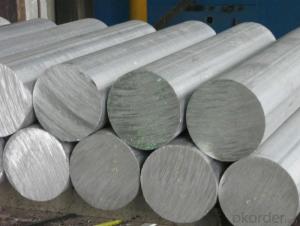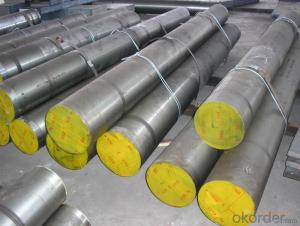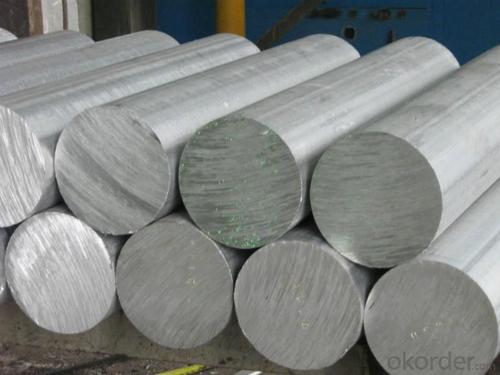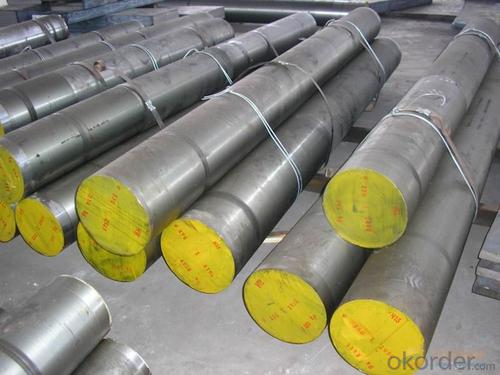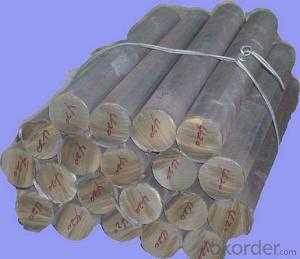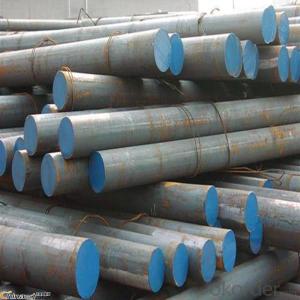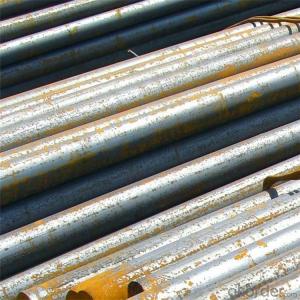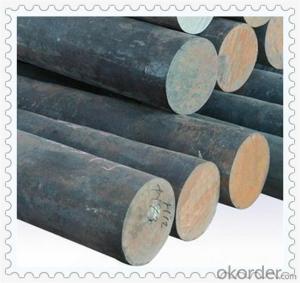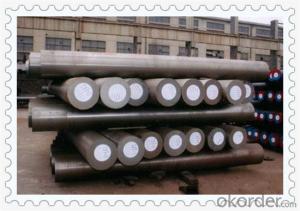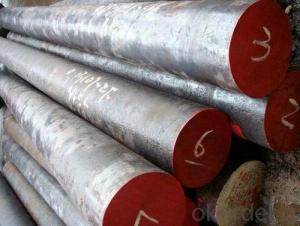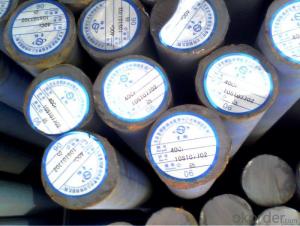SAE 4340 Alloy Steel Round Bar SCM430 Steel Bar
- Loading Port:
- Tianjin
- Payment Terms:
- TT OR LC
- Min Order Qty:
- 25 m.t.
- Supply Capability:
- 50000 m.t./month
OKorder Service Pledge
OKorder Financial Service
You Might Also Like
Specification
SAE 4340 Alloy Steel Round Bar SCM430 Steel Bar
Product Details:
1) Melting process: BOF + LF + VD
2) Heat treatment: Normalized / Annealed / Quenched / Tempered
3) Surface condition: Black surface / Peeled / Turned / Milled
4) Straightness: Max.3mm/1000mm
5) Appearance: Free of cracks, visible inclusions, pit on the appearance;
6) Guarantee: Ultrasonic test according to SEP 1921-84 G3 C/c
7) Certificate of quality: SGS
8) Marking: Grade, Heat No.,Diameter will be stamped one each bar with required color
9) Packing: In bulk packing
10) MOQ: 25 tons / Grade / Size
11) Delivery time: 30 days
12) Payment: T/T or 100% LC at sight.
Designation by Standards
rand Name | Ravne No. | Mat. No. | DIN | EN | AISI |
42CD4 | 514 | 1.7225 | 42CrMo4 | - | 4140 |
Chemical Composition (in weight %)
C | Si | Mn | Cr | Mo | Ni | V | W | Others |
0.39-0.45 | 0.1-0.4 | 0.6-0.9 | 0.9-1.2 | 0.15-0.25 | - | - | - | - |
Application:
ASTM 4340 Steel Bar have been used in aviation,aerospace,navigation,nuclear energy,chemical industry,
electronic information,machine manufacture, petrochemical, automotive,instrument and meter, Communication ,transportation, and medical instruments etc.
Product Show:
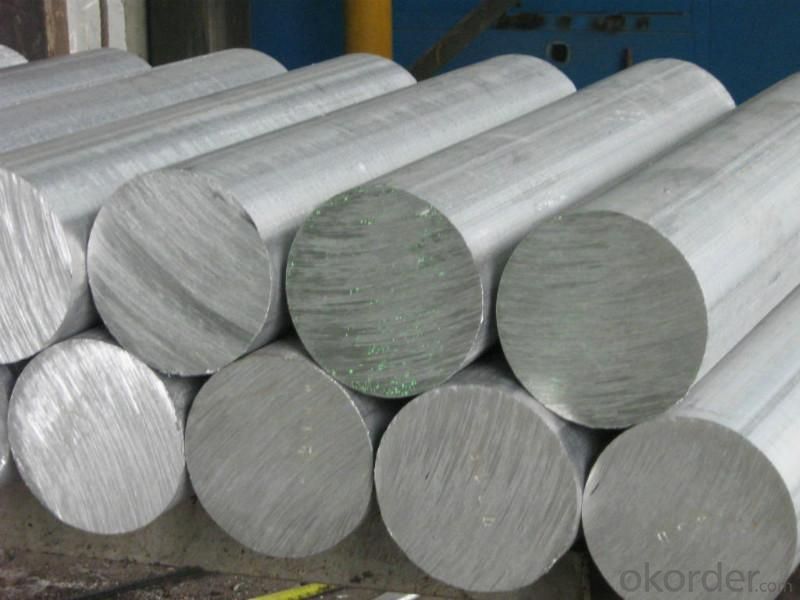
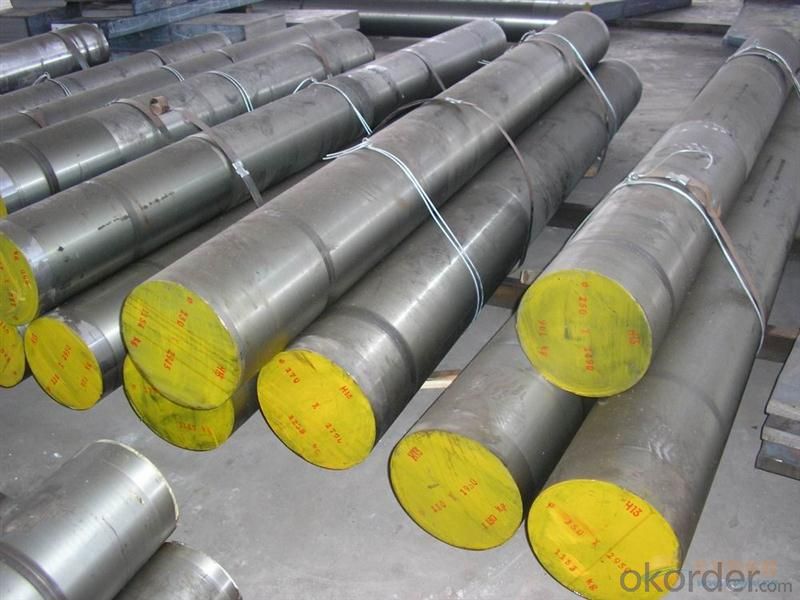
- Q: Can special steel be cast?
- Yes, special steel can be cast.
- Q: How does special steel contribute to the renewable energy equipment industry?
- Special steel plays a crucial role in the renewable energy equipment industry by providing the necessary strength, durability, and corrosion resistance required for various components. One of the key applications of special steel in this industry is in wind turbines. Wind turbine towers, blades, and gearboxes are all manufactured using special steel alloys due to their high tensile strength and resistance to fatigue. This enables wind turbines to withstand the harsh environmental conditions and operate efficiently for prolonged periods. Moreover, special steel is also extensively used in the production of solar power equipment. Solar panels are often framed using stainless steel, which offers excellent corrosion resistance and structural stability, ensuring their longevity and performance in outdoor environments. Additionally, special steel alloys are employed in the manufacturing of solar trackers, which enable solar panels to follow the sun throughout the day, optimizing their energy generation potential. In the hydroelectric power industry, special steel is employed in the construction of turbine components, such as blades, shafts, and casings. These components are subjected to high pressures, water flow, and abrasive wear, making the use of special steel essential to ensure their reliability and longevity. Furthermore, special steel is also utilized in the production of energy storage systems, such as batteries and fuel cells. These technologies require materials with high conductivity, corrosion resistance, and mechanical strength, making special steel alloys ideal for their construction. Overall, special steel contributes significantly to the renewable energy equipment industry by providing the necessary strength, durability, and corrosion resistance required for various components. Its utilization in wind turbines, solar panels, hydroelectric power systems, and energy storage technologies ensures the reliability and longevity of these equipment, ultimately promoting the growth and sustainability of the renewable energy sector.
- Q: What are the main alloying elements in special steel?
- The main alloying elements in special steel are chromium, nickel, molybdenum, vanadium, and tungsten.
- Q: What are the environmental impacts of producing special steel?
- The environmental impacts of producing special steel can include air pollution from emissions released during the steelmaking process, such as carbon dioxide, sulfur dioxide, and nitrogen oxide. Additionally, the extraction of raw materials for steel production, such as iron ore and coal, can result in deforestation, habitat destruction, and water pollution. The energy-intensive nature of steel production also contributes to greenhouse gas emissions and climate change. Proper waste management and implementation of sustainable practices can mitigate some of these environmental impacts.
- Q: What are the different surface finishing techniques for special steel parts?
- Special steel parts can undergo various surface finishing techniques to enhance their appearance, protect against corrosion, and improve overall performance. Some commonly utilized methods include: 1. Achieving a smooth and glossy surface on the steel part through polishing, using abrasives. This technique not only enhances aesthetics but also enhances resistance against corrosion. 2. Plating involves depositing a layer of metal onto the steel part's surface, with options such as chrome, nickel, and zinc. This technique provides additional protection against corrosion, improves wear resistance, and can offer desired color or finish. 3. Powder coating entails electrostatically applying a dry powder to the steel part's surface, followed by heat curing. The melted powder forms a durable and visually appealing coating that provides excellent resistance against corrosion, impact, and chemicals. 4. Anodizing, primarily used for aluminum but applicable to certain special steel parts, creates a controlled oxide layer on the surface. This enhances corrosion resistance, improves appearance, and can even provide insulation. 5. Employing a chemical process known as passivation removes free iron and contaminants from the steel part's surface. This process helps prevent corrosion and enhances resistance against staining or discoloration. 6. Heat treatment involves altering the physical and mechanical properties of the steel part by subjecting it to heating and cooling. This process improves hardness, strength, toughness, and provides desired surface finishes. 7. Through electropolishing, an electrochemical process, a thin layer of metal is removed from the steel part's surface. This technique eliminates surface imperfections, smoothens the part, and enhances corrosion resistance. Choosing the appropriate surface finishing technique is crucial, taking into consideration the specific requirements of the special steel part, including its function, desired appearance, and the environmental conditions it will encounter.
- Q: What are the main applications of special steel in the electronics packaging?
- Special steel is widely used in electronics packaging due to its unique properties. The main applications of special steel in electronics packaging include providing high strength and durability to protect delicate electronic components, offering excellent corrosion resistance to safeguard against environmental factors, and ensuring thermal conductivity for efficient heat dissipation. Additionally, special steel is utilized in creating precise and intricate shapes for components, ensuring electromagnetic compatibility, and providing electrical conductivity for improved performance and reliability in electronic devices.
- Q: What is the role of carbon in special steel?
- Carbon plays a crucial role in special steel as it significantly influences its properties and performance. Special steel refers to a category of steel that is specifically engineered to exhibit exceptional characteristics, such as high strength, hardness, wear resistance, or corrosion resistance. Carbon is one of the main alloying elements in special steel, and its content determines many of these desired properties. Firstly, carbon is responsible for increasing the strength and hardness of special steel. As carbon is added to the iron matrix, it forms iron carbides, which are extremely hard and provide structural integrity to the steel. The higher the carbon content, the greater the hardness and strength of the steel. This makes special steel suitable for applications requiring high toughness, durability, and resistance to deformation, such as in the manufacturing of tools, dies, and industrial machinery components. Secondly, carbon contributes to the wear resistance of special steel. The presence of carbon enhances the steel's ability to resist abrasion and withstand extreme conditions. This is particularly important in industries like mining, construction, and oil and gas, where components are subjected to intense wear and friction. Furthermore, carbon also plays a crucial role in determining the machinability and weldability of special steel. The carbon content affects the steel's response to heat treatment, making it easier or harder to machine or weld. The right balance of carbon content is essential to ensure that special steel can be easily worked on and fabricated into complex shapes without compromising its properties. Lastly, carbon influences the corrosion resistance of special steel. While steel is generally prone to corrosion, the addition of certain amounts of carbon can enhance its resistance to rusting and other forms of corrosion. This is particularly important in applications where the steel is exposed to harsh environments, such as marine or chemical industries. In summary, carbon plays a vital role in special steel by increasing its strength, hardness, wear resistance, machinability, weldability, and corrosion resistance. The precise amount of carbon added to the steel is carefully controlled to achieve the desired properties for specific applications, making special steel a highly versatile and sought-after material in various industries.
- Q: Can special steel be used for aerospace engine components?
- Yes, special steel can be used for aerospace engine components. Special steel alloys, such as nickel-based superalloys, are often used in the manufacturing of aerospace engine components due to their excellent high-temperature strength, corrosion resistance, and ability to withstand extreme conditions. These steel alloys are specifically designed to meet the stringent requirements and demands of aerospace applications, ensuring optimal performance and reliability of the engine components.
- Q: What industries use special steel?
- Special steel plays a vital role in multiple industries, relying on its unique properties to carry out their operations. The automotive industry, for instance, utilizes special steel extensively in manufacturing engine parts, transmission systems, and chassis components. The exceptional strength, durability, and corrosion resistance of special steel make it an ideal choice for withstanding the challenging conditions faced by automotive components. Similarly, the aerospace industry heavily relies on special steel in constructing aircraft structures, engine components, and landing gear systems. The lightweight yet robust characteristics of special steel are crucial in ensuring the safety and performance of aircraft. In the energy sector, special steel is essential for producing equipment used in oil and gas exploration, such as drilling rigs, pipelines, and offshore platforms. The high-strength and corrosion-resistant properties of special steel enable it to withstand the harsh operating conditions prevalent in this industry. The construction industry is also a significant consumer of special steel, using it in the manufacturing of structural components, reinforcing bars, and precast concrete products. Special steel provides the necessary strength and durability required for building structures capable of withstanding diverse environmental conditions and heavy loads. Moreover, the manufacturing and machinery industry relies on special steel for producing heavy machinery, industrial equipment, and machine tools. The exceptional strength, wear resistance, and heat resistance properties of special steel make it well-suited to meet the demanding requirements of these applications. Lastly, the defense and military industry heavily depends on special steel for producing military vehicles, weapons, and armor. Special steel's ability to withstand extreme conditions and provide protection makes it a critical material in this industry. Overall, special steel's exceptional properties of strength, durability, corrosion resistance, and heat resistance make it indispensable across various industries. Its applications span from automotive and aerospace to energy, construction, manufacturing, and defense sectors, where reliability and performance are of paramount importance.
- Q: Can special steel be heat treated?
- Yes, special steel can be heat treated. Heat treatment is a process used to alter the physical and mechanical properties of steel by heating it to specific temperatures and then cooling it at controlled rates. This treatment allows for the adjustment of hardness, strength, toughness, and other desired characteristics in special steel.
Send your message to us
SAE 4340 Alloy Steel Round Bar SCM430 Steel Bar
- Loading Port:
- Tianjin
- Payment Terms:
- TT OR LC
- Min Order Qty:
- 25 m.t.
- Supply Capability:
- 50000 m.t./month
OKorder Service Pledge
OKorder Financial Service
Similar products
Hot products
Hot Searches
Related keywords
